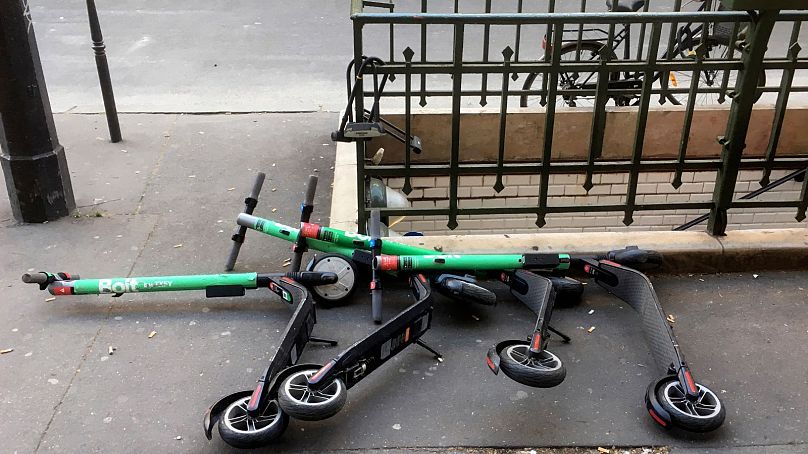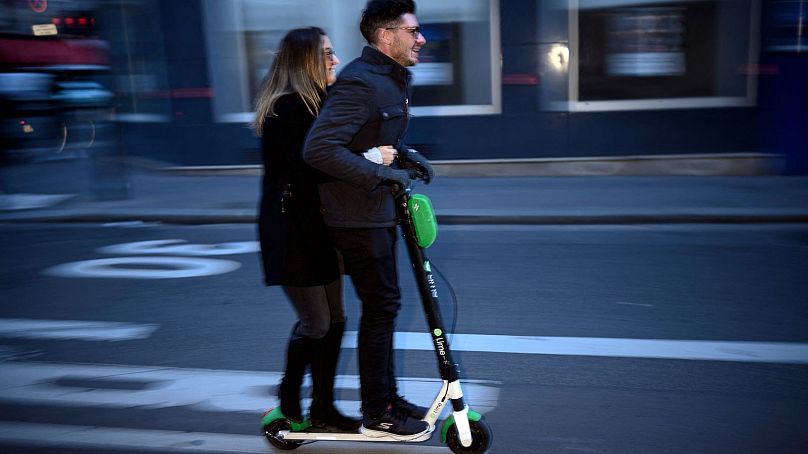E-scooter operators are on a mission to convince the city of Paris to keep their devices on the streets.
Love them or loathe them, electric scooters have become part of the landscape across many big European cities.
 ADVERTISEMENT
ADVERTISEMENT
 ADVERTISEMENT
ADVERTISEMENT
For those who ride them, they can prove incredibly useful; when the subway is packed or the buses are stuck in rush-hour traffic, they can be the last-minute option that miraculously gets them to work and to appointments on time.
But for many, the devices are a scourge that can clutter pavements, end up at the bottom of a river, or worse, cause deadly accidents.
This month, the deputy mayor of Paris, David Belliard called shared e-scooters “very cumbersome, accident-prone and anti-environmental” and his Green party even called for them to be banned from the city when the operators’ contract expires in February 2023.
Now these operators – Dott, TIER and Lime – are fighting back and joining forces to make the case that the 15,000 e-scooters they manage are not to blame for all the evils in the city.
They’ve presented a host of data to the Paris mayor’s office to argue not only that e-scooters have become a major transportation mode in the capital, but also that they’re being enriched with technology ensuring they don’t exceed speed limits and are parked in the right places.
“We are being used and we are useful. Now a lot of things need to be improved, and this is what we are working on,” Nicolas Gorse, Regional General Manager for Dott in France, told Euronews Next.
“We have, together with the other operators, presented ambitious proposals. They are currently being examined by the city of Paris and will be discussed during an upcoming meeting,” said a spokesperson for TIER.
Free-floating e-scooters have been used by over 450,000 people in Paris in September alone, according to data compiled by the three operators and shared with Euronews Next.
That amounts to one trip every four seconds, and operators say they’ve lately seen an uptick in use since strikes at France’s oil refineries have made it difficult for many motorists to find gas.
A recent Ipsos survey commissioned by Dott, Lime and TIER found that 88 per cent of Parisians considered e-scooters part of daily transport. It showed more than half of Parisians had already used an e-scooter, including the vast majority of those aged 18-34 (82 per cent).
Geofencing, sensors and ID checks
Operators say that 96 per cent of the devices are now parked where they should be – and not getting in the way of pedestrians by lying haphazardly on pavements.
That’s mostly because geo-tracking software now prevents users from ending their ride on the app unless they are inside one of the city’s 2,500 dedicated parking areas.
In parallel, a special patrol tours Paris every day to reposition those that aren’t or have fallen over.
Speed limiters also already prevent e-scooter riders from going beyond 20 km/h or even 10 km/h in areas with a lot of pedestrians such as outside schools or shopping centres.
Going forward, Dott says it’s experimenting with sensors to prevent two people from getting onto one e-scooter – a common sight across cities in France, and one that led to the death of two teenagers when their e-scooter was hit by an ambulance in August in Lyon.
That tragedy led authorities in the city to ban e-scooter use for those under 18, forcing operators to require ID checks on their apps before unlocking trips. “This has proved to be efficient and could be an idea for Paris,” Gorse said.
‘A very frugal vehicle’
When e-scooters took European cities by storm, there were lots of reports of them being flimsy, easily broken and discarded in the environment. In Paris, this was typically the bottom of the Seine river.
But that latter scenario is now “extremely rare,” said Gorse. The three operators have been paying for professional divers to fish e-scooters out of the Seine once a month, “but now there are so few that we’re slightly reducing the frequency,” he added.
He explains this by the fact that e-scooters today are much heavier than they used to be, weighing around 30 kg.
“So, it's not like you're throwing a 10 kg thing into the Seine,” he said.
The second reason is that the GPS tracking onboard the e-scooters prevents riders from parking along the Seine.
If they do, they’re fined, a signal is sent to the company’s patrollers and the device is collected “within three hours,” Gorse said.
Their greater weight and sturdiness also make e-scooters more durable, operators argue. They estimate that the average lifespan of an e-scooter today is about five years.
The current generation has already been on the streets of Paris for over three and a half years, each of them raking up around 7,000 km of mileage, Gorse said.
“When you see a scooter, it's obviously a very frugal vehicle,” he added.
Dott and its peers argue that e-scooters use 10 times less energy than a moped and 100 times less than an electric car.
A Harris Interactive survey commissioned by Dott, Tier and Lime earlier this year found that if e-scooters were banned in Paris, 35 per cent of users said they would replace their trips with a personal car or would use a ride-hailing app like Uber.
Would these riders walk more? Not necessarily, say operators, noting that the average e-scooter ride in Paris is 3.2 km – which would take over an hour to cover on foot.
They present e-scooters more as a way to relieve public transport during the morning and evening rush hours.
They warn that banning shared e-scooters would most likely push users towards privately owned e-scooters, which are harder to regulate.












